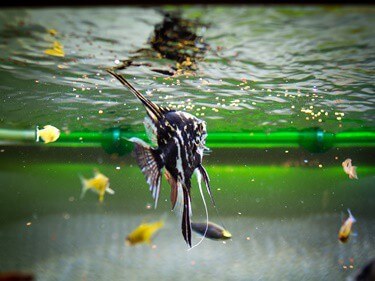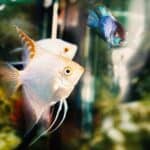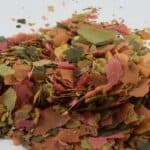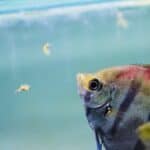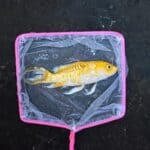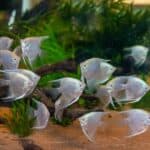Last Updated on: 2nd November 2023, 12:58 pm
It’s easy to fall into the trap of overfeeding fish, which does more harm than good. Can fish die from overeating? While not all fish are prone to excessive eating, it happens.
Overeating food is a common cause of death in fish. If fish are allowed to eat more than they should, they can develop life-threatening conditions, like fatty liver disease, fin rot, obesity, and constipation.
The signs you’re overfeeding fish include weight gain and obesity, low water quality, dangerous pH, oxygen and ammonia levels, and algae build-up.
If you have many fish species in a tank, larger fish may overeat, causing the smaller fish to starve to death. If you notice that fish are becoming too fat, you’re likely overfeeding them.
Do Fish Keep Eating Until They Die?
Most fish species only eat until they feel full. However, fish that live in the wild don’t know when their next meal will come, so they eat more than they need to keep themselves full.
This is usually followed by days of going hungry until they find more food.
Some fish, including those in captivity, are hardwired to eat whatever food comes their way, even if it’s excessive. Whether fish die from overeating also depends on the food being given to them.
Dry pellets and flakes expand when wet. If fish swallow them while they’re still relatively dry, the food will expand in the stomach instead of in the tank’s water. As a result, some fish die as their digestive system is overwhelmed due to the strain.
Not all fish die directly from overeating, but many problems arise from eating too much or there being too much food in the tank.
How Do Fish Die from Overeating?
These health issues are all caused entirely or indirectly by overeating:
Fatty Liver Disease
Fatty liver disease (also known as hepatic lipidosis) commonly affects African cichlids and rainbowfish.
MSD Vet Manual explains that a high percentage of carbohydrates and high-fat foods cause the problem, which is also a common symptom of overeating.
Due to fatty liver disease, fish can become unwell and eventually refuse to eat as their digestive systems fail. In severe cases, death can happen as the liver can’t function properly.
Fin Rot
Fin rot is an infectious disease caused by several species of bacteria.
While it’s easy to treat, the most common causes are environmental and almost always involve stress. Overeating also triggers the condition. Other causes include:
- Dirty water.
- Aggressive fish.
- Injury to the tail and fins.
- Overcrowding.
- Handling by humans.
- Environmental disruptions.
Fish with fin rot display the following signs:
- Discoloration on the fins.
- Milky edges.
- Fraying of the tail and fins.
- Ragged edges where pieces of the tail and fins fall off.
- Red and inflamed patches.
- Secondary fungal infections.
As described by Proceedings of the Indian Academy of Sciences, fin rot is aggravated by overcrowding and dirty water, which excess feces contributes to.
Overeating causes fish to poop more, tainting the water quality and increasing the ammonia content.
If fin rot isn’t treated, the affected fish die. Antibiotics can clear the condition, but fish mustn’t be allowed to overeat, or the condition may return.
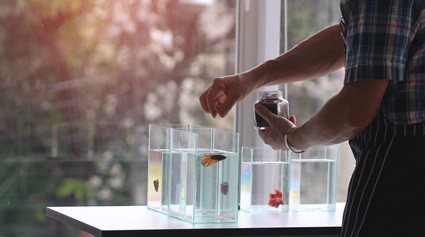
Constipation
Fish often become constipated when they overfeed on flakes and pellets, especially on low-quality varieties that contain less fiber. Constipation causes uncomfortable bloating and stringy feces.
Constipation can have devastating consequences if not treated, sometimes leading to death.
To overcome constipation, fish must be fed green foods because they’re high in fiber. The extra fiber bulks out and softens the stool. Healthy green foods for fish include:
- Algae
- Tinned peas
- Blanched curly lettuce
- Spinach
- Cucumber
- Zucchini
- Carrot
- Sweet potato
Also, reduce th fish’s flake and pellet intake to provide a healthier diet.
Will Fish Eat Until They Explode?
It’s implausible that fish will explode from overeating. However, small fish can eat so much food that their stomachs and digestive systems rupture.
Some fish, like the common goldfish, don’t have the brain receptors to tell them when they’re full. So, they’ll eat all the food inside the tank, even if it overwhelms their digestive systems.
This usually takes a long time, as the digestive system can’t cope with the strain. You’d have to overfeed the fish significantly for them to explode, but it can happen.
Similarly, constipated fish are more likely to develop problems, as the waste has nowhere to go, so it builds up inside the gut.
A lack of appetite is a side effect of constipation, so the fish would likely stop eating before exploding.
Therefore, it’s the owner’s responsibility to provide the food fish need. You might want to treat your fish to extra food, but doing so can kill them.
Overfeeding Fish Symptoms
Excessive food floating in the tank disrupts the tank’s ecosystem, resulting in an imbalance that causes sickness. Signs you’re overfeeding fish include the following:
- Cloudy water
- Food at the bottom of the tank
- Dirty gravel
- Low pH
- Pellets and flakes floating in the water
- Overweight fish
Consequently, the following issues are likely to occur:
Poor Water Quality
Overfeeding fish results in decaying matter in the aquarium. Fish don’t eat rotting food, so it lies inside the tank, decomposing and releasing ammonia and nitrites into the water.
Also, fish that have overeaten will poop more, adding to the decaying matter in the tank. When ammonia rises to extreme levels, it causes poisoning, resulting in a slow and painful death.
Low Oxygen Levels
Decaying food is an aerobic process that uses lots of oxygen and produces high carbon dioxide levels, resulting in a lack of dissolved oxygen inside the tank.
As a result, fish may struggle to breathe and spend most of their time at the tank’s surface to find oxygen. Their gills will move more vigorously as they attempt to increase their oxygen intake.
Affected fish swim less and may float in the tank, as they have little energy to move.
Algae in The Tank
Too much food causes algae inside the tank that coats the tank’s surface and gravel.
When uneaten food is left in the tank, algae spores feed off the nutrients, causing them to multiply. This is an easy way to tell that you’re overfeeding fish.
Clean the algae off the tank’s surfaces before it causes a spike in ammonia and nitrites.
Unpleasant Odors
As well as a build-up of algae, dirty water emits a foul odor that many owners find unpleasant.
Rotten food attracts harmful bacteria that accumulate inside the tank. The tank will begin to smell bad due to decaying organic matter and raised ammonia levels.
How To Prevent Overfeeding Fish
If fish are putting on excessive weight, consider how to prevent overfeeding.
If you don’t, fish can develop a range of health problems that eventually cause them to die. To stop overfeeding pet fish, follow these steps:
Adhere To A Schedule
Most fish respond well to a twice-daily feed – one in the morning and one in the afternoon. However, some fish prefer smaller feeding sessions more often throughout the day.
Monitor the fish’s eating habits and decide which schedule they respond to.
Once you’ve decided on one, stick to it. That way, fish will know when they’ll be fed each day. This makes the fish less likely to overfeed, as they know food is coming.
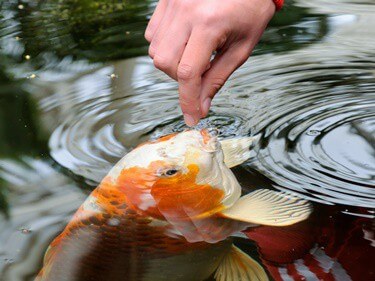
Measure The Food
We’re not advising you to weigh food with scales but to measure the amount you’re feeding your fish.
Once you’ve placed an appropriate amount of food into the tank, observe the fish to see how much they eat. Assess how long it takes them to consume everything.
If the fish eat all the food in under 4 minutes, you may not have given them enough. Add more to the tank so that scavenger fish who prefer to eat slower get fed.
Also, feed based on the number of fish, not the tank size.
Separate Different Fish Species
Different fish species have alternative eating habits. Some dominate the tank, particularly at feeding time. Some fish want excess food and eat what’s available without giving smaller fish a chance.
If so, rethink the set-up of the fish inside the tank, separating the big and small fish.
Nutritious Diet
To ensure the fish receive optimum nutrition and aren’t overfeeding on junk food, provide flakes or pellets rich in vitamins and minerals.
The quality feed keeps fish full for longer, reducing the risk of overfeeding due to hunger.
How Much Should I Feed My Fish?
Freshwater fish are slender, so it’s easy to tell when they’re overeating. What’s not so easy is knowing how much to feed them. All species of fish have different food requirements.
Providing enough food that allows fish to eat everything within 5 minutes is about right. Or, if you’re looking at the amount to feed per fish, aim for 30-60 seconds of non-stop eating time.
If in doubt, underfeed fish. Uneaten food falls to the bottom of the tank, where it decays and rots, causing a spike in ammonia levels if left for too long. Ammonia poisoning is often fatal.
If you have fed the fish too much food, remove all waste from the tank to avoid decomposition. Fish won’t touch old, rotting food, so they won’t return to eat it later.
Greedy fish or fish that aren’t on a regular feeding schedule are hardwired to eat as much as possible to prevent starvation, even if they’re due another feed session on the same day.

